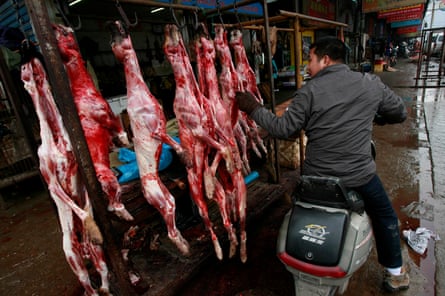A Brief Colonial History Of Ceylon(SriLanka)
Sri Lanka: One Island Two Nations
A Brief Colonial History Of Ceylon(SriLanka)
Sri Lanka: One Island Two Nations
(Full Story)
Search This Blog
Back to 500BC.
==========================
Thiranjala Weerasinghe sj.- One Island Two Nations
?????????????????????????????????????????????????Friday, February 28, 2020
Shenzhen could be first city in China to ban eating of dogs and cats
Officials says move reflects bond between pets and people – ‘the consensus of all human civilisation’ – rather than coronavirus fears
 Michael Standaert-27 Feb 2020
Michael Standaert-27 Feb 2020Dog meat has long been a popular delicacy in China, but attitudes are shifting. Photograph: EPA
Shenzhen is set to become the first city in mainland China to ban the
eating of dogs and cats, if a draft regulation released by the municipal
government in a wider push to restrict the consumption of wild animals
is approved.
On Monday, China’s National People’s Congress issued an order to ban all consumption of
wild animal meat and further restrict the wildlife trade nationwide.
The measures are expected to be enshrined in the country’s wildlife
protection law later this year.
The ban is a swift response to the Covid-19 outbreak, thought to have
originated in wildlife sold at a market in Wuhan, Hubei province in
early December.
“Shenzhen might just be able to do it, as it is a progressive city in
many ways,” said Deborah Cao, a professor at Griffith University in
Australia and expert on animal protection in China. “I really hope so.”
Consumption of dog and cat meat is most common in Shenzhen’s home
province of Guangdong, neighbouring Guangxi, and parts of north-east
China, though it is not universally practised across the country and has
become less acceptable over time. Taiwan outlawed the consumption of dog and cat meat in 2017.
“Dog eating has become increasingly controversial in China, with frequent violent clashes between dog thieves and angry dog owners,” said Wendy Higgins, director of international media at Humane Society International (HSI).
“Dog eating has become increasingly controversial in China, with frequent violent clashes between dog thieves and angry dog owners,” said Wendy Higgins, director of international media at Humane Society International (HSI).
“There is a growing and vocal Chinese opposition to the dog and cat meat
trade, and young people in China are far more likely to think of dogs
as companions than cuisine,” she said.
The draft regulation is now in a public comment phase running until 5 March and no timeline has been given for the final determination.
If the ban goes through, other animals identified as potentially
carrying disease – such as turtles, snakes, some birds and insects –
could be included on a list of prohibited animals for consumption in
line with national rules that are expected in the coming months.
Under the Shenzhen ban, fines for serving banned animals at restaurants
would range from 20,000 to 200,000 yuan (£2,200–£22,000).
HSI has estimated that
between 10 and 20 million dogs are killed in China for their meat
annually, while protection group Animals Asia puts the figure for cats
at roughly 4 million a year.
“The vast majority of dogs caught up in the trade in China are stolen
pets and strays snatched from the streets,” Higgins said. “After being
stolen or snatched, the animals are crammed in small cages in their
hundreds, unable to move, and piled on the back of trucks, packed so
tightly they can break limbs.”
Animal protection groups have long been concerned with practices used in
the dog meat trade, from rearing and theft to transport and slaughter.
